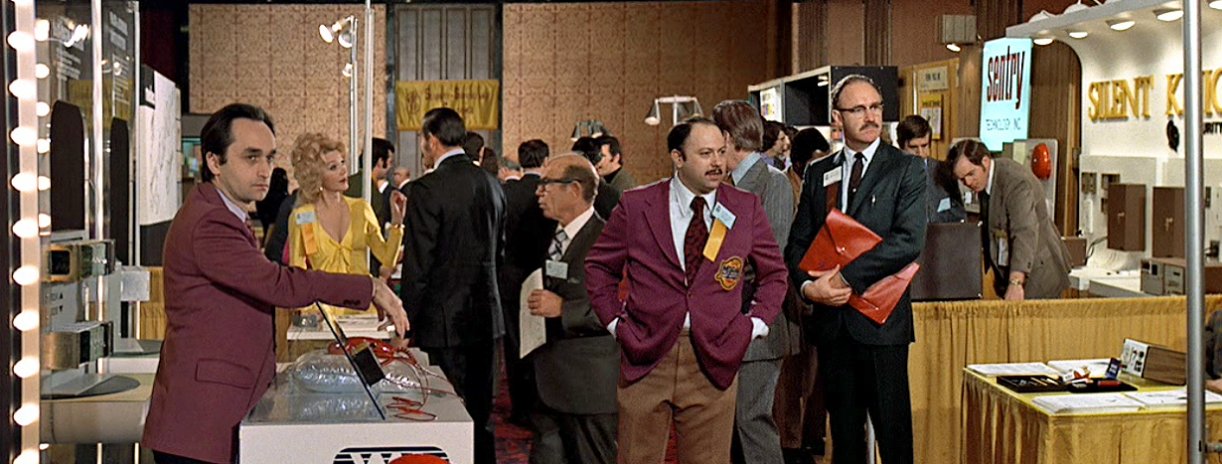MICHAEL PHILLIPS REVIEWS NEWLY-STRUCK 35MM PRINT OF THE CONVERSATION, SUPERVISED BY COPPOLA

The Chicago Tribune's Michael Phillips revisits The Conversation:
“The Conversation” returns this week in a terrific, newly struck 35 millimeter print supervised by Coppola and distributed by Rialto Pictures, playing Jan. 28 to Feb. 3 at the Music Box. Its enveloping chill feels, looks and — crucially, in a story about a man who eavesdrops for a living — sounds as arresting as ever.
With a role originally offered to Marlon Brando, Coppola’s modestly scaled masterwork turned out to be two of Gene Hackman’s finest hours, in which he delineates a morally haunted surveillance expert’s world in incremental, barely perceptible ways, usually through action and reaction, not words.
Harry reveals little. His San Francisco apartment, furnished in the style of Early Anonymity, contains “nothing of value,” as he tells his building manager in a testy phone call early on, when Harry learns the manager has a key to his place. Outside Harry’s place the building across the street is being razed; Coppola’s script originally filled in many details and larger forces regarding who’s building the “new” San Francisco, and how.
Harry has no car, no phone, a frosty working relationship with his less fastidious fellow surveillance expert Stan, played by John Cazale. The subtly extraordinary opening sequence in “The Conversation,” endlessly rewatchable thanks to sound designer/editor and film editor Walter Murch’s brilliant aural and visual manipulations, takes place in Union Square at lunch time.
The sound wizards record fragments of conversation, from various locations and with various electronic means, between an apparent pair of young lovers (Cindy Williams of “Laverne and Shirley” and Coppola regular Frederic Forrest). Harry has been hired to tape their open-air rendezvous and deliver the results, for $15,000, to an unnamed businessman (Robert Duvall) and his achingly smug assistant (Harrison Ford, a year after “American Graffiti”). Harry doesn’t know anything about their reasons for the surveillance, or care.
What he discovers on the tapes, alone, later, at one of his three reel-to-reel recorders, suggests a crime in the making. Harry’s clouded past has blood on it already. An earlier job Harry worked resulted in the murder of three people. A devout Catholic, he lives his clam-like life with all his residual guilt crammed inside the shell. There’s barely room for occasional trysts with a lover (Teri Garr), or awkward socializing with acquaintances in the bugging community (Allen Garfield plays an East Coast rival).
Guided, gently, by composer David Shire’s solo piano fragments — loneliness, crystallized — “The Conversation” owes an acknowledged debt to Michelangelo Antonioni’s international 1966 sensation “Blowup,” as well as to Hermann Hesse’s “Steppenwolf,” with its riddle of a protagonist, isolated from society and even from himself. What Antonioni did with photography, and the notion of a sinister subplot hiding in plain sight, Coppola and Murch did with sound, and images carefully attuned to that sound. Coppola began working through the themes of “The Conversation” in the late ‘60s, when wiretapping was still legal. On “The Godfather,” Coppola narrowly avoided getting fired off his own movie, by firing those who were conspiring to fire him first. “The Conversation” may have been a smaller project, in the wake of the huge financial success of the first “Godfather,” but it wasn’t much easier for Coppola, as he revealed in a remarkable interview with fellow filmmaker Brian De Palma. Many pages, some key to the lucidity and back story of the narrative, went unfilmed due to time and money.
Many, including me, suspect the movie’s far richer and more troubling without those pages. Some would claim “The Conversation” is Coppola’s most essential work — a bridge between his commercial filmmaker self and the filmmaker striving for personal expression. It’s rarely either/or, of course, with moviemakers who have greatness to share.
Hackman often spoke of his frustrations with Harry, whom even Coppola described as a blank, a cipher. The film has its limitations: not all of the expository details are handled with equal finesse, partly because of those unfilmed pages; in this primarily male universe, the women are expendable, dismissible; and in an otherwise superb portrayal, Hackman seems ever so slightly uncertain in what he has to say, and how, in a key dream sequence.
These are small matters in a key film of its decade. (I had the good fortune to introduce it on Turner Classic Movies once.) Seeing it again in this beautiful new 35 mm print, “The Conversation” seems itself in conversation with an earlier San Francisco-set classic, Hitchcock’s “Vertigo.” Like Coppola’s film, “Vertigo” met an indifferent, vaguely mystified public reception in its initial release. “The Conversation” is also fully conversant in the language of ‘70s downbeat genre pictures with a difference. (Hackman soon went on to director Arthur Penn’s pungent detective tale “Night Moves.”) In that decade, so much modestly budgeted, modestly profitable studio work pre-”Star Wars” wasn’t afraid to unsettle an audience, or leave it hanging, in the service of a story unconcerned with tidy solutions, or dime-store redemption.
Hackman turned out to be exactly right for Harry Caul: He gives us a formidable island, trying desperately not to be seen, or judged. The climax delves into “precognition” visions of horror, of Harry’s own making. Nothing can be trusted, not even the recorded sounds on Harry’s reel-to-reel. It’s not always what you say. It’s how you say it.
Or hear it.



